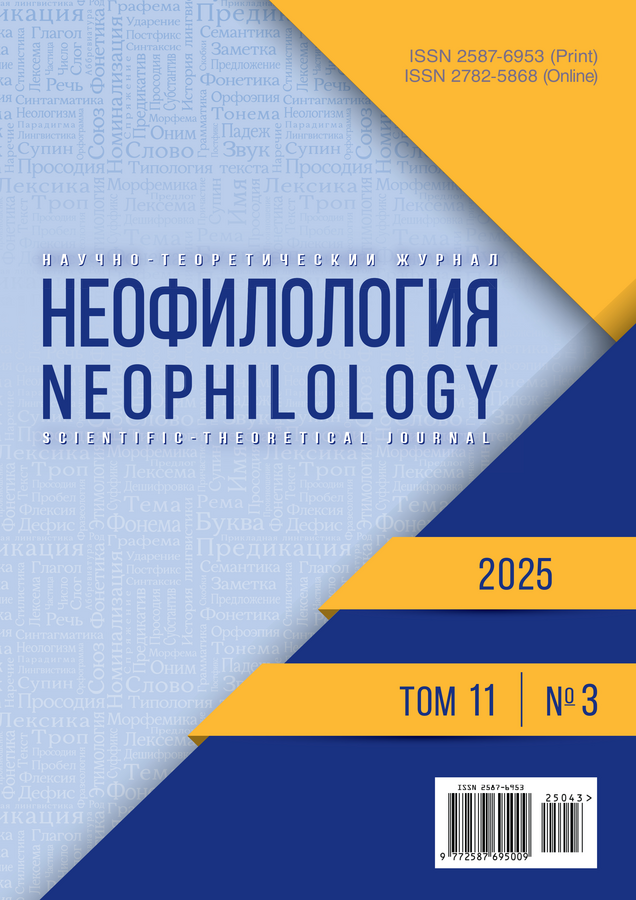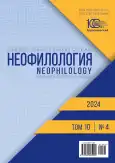Имя собственное в нормативно-научном тексте
- Авторы: Максимчук Н.А.1
-
Учреждения:
- ФГБОУ ВО «Смоленский государственный университет»
- Выпуск: Том 10, № 4 (2024)
- Страницы: 838-850
- Раздел: ОНОМАСТИКА
- URL: https://journal-vniispk.ru/2587-6953/article/view/295623
- DOI: https://doi.org/10.20310/2587-6953-2024-10-4-838-850
- ID: 295623
Цитировать
Полный текст
Аннотация
ВВЕДЕНИЕ. Способность имени собственного отражать как собственно предметные сведения, так и многоплановую фоновую информацию ставит его в один ряд с основным носителем научного знания – термином. В исследовании языкового выражения знания актуальным становится вопрос о роли и месте ономастической лексики в содержании школьного образования. Целью исследования является анализ качественного состава, количественных параметров и характера взаимоотношений имён собственных в структуре существующих учебных текстов, что позволит сформулировать требования к организации ономастического наполнения вновь создаваемых текстов.МАТЕРИАЛЫ И МЕТОДЫ. Материалом исследования послужил массив имён собственных, извлечённых методом сплошной выборки из текстов учебников и программ по всем предметам общего среднего образования конца 1980-х – начала 2000-х гг. При обработке полученного материала, представленного в формате Базы данных, использовались аналитический, сопоставительный, полевой методы, элементы статистического метода.РЕЗУЛЬТАТЫ ИССЛЕДОВАНИЯ. Определено общее количество и состав ономастических единиц в учебных текстах, установлены показатели частотности и распространённости данных единиц, разграничены ядерные и периферийные компоненты данного ономастического пространства, выявлено соотношение повторяющихся и единичных онимов, охарактеризована их роль в выражении предметного знания, сформулированы условия оптимальной организации учебного ономастического пространства.ЗАКЛЮЧЕНИЕ. Полученные данные дают представление об объёме и характере ономастического фрагмента общеобязательного научного знания, отражаемого в нормативнонаучных текстах анализируемой эпохи. Эти результаты создают основу для реализации системного подхода к организации ономастической лексики в рамках нормативно-научных текстов. Сопоставление полученных данных с данными других временных отрезков позволит определить ономастический инвариант и переменные элементы в разновременных представлениях о составе базового ономастического знания.
Об авторах
Н. А. Максимчук
ФГБОУ ВО «Смоленский государственный университет»
Автор, ответственный за переписку.
Email: nmaximchuk@yandex.ru
ORCID iD: 0000-0003-2792-1355
доктор филологических наук, профессор, профессор кафедры русского языка
214000, Российская Федерация, г. Смоленск, ул. Пржевальского, 4Список литературы
- Максимчук Н.А. Нормативно-научная картина русской языковой личности в комплексном лингвистическом рассмотрении: в 2 ч. Смоленск: Изд-во СГПУ, 2002. Ч. 1. 162 с.
- Оксенчук А.Е. Специфика учебного научного текста: основные подходы к понятию «учебный текст» // Наука – образованию, производству, экономике: материалы ХVIII (65) Регион. науч.-практ. конф. Витебск: ВГУ им. П.М. Машерова, 2013. Т. 2. С. 277-279. https://elibrary.ru/yupmsd
- Подолина О.В. Учебный текст как объект лингвистического исследования // Семантика и прагматика языковых единиц в синхронии и диахронии: норма и вариант: VI Междунар. науч. конф.: сб. науч. статей. Симферополь: Ариал, 2017. С. 243-248. https://elibrary.ru/zsfwoz
- Николаева Т.Н. Понятие «учебный текст» в научном дискурсе // Наука и школа. 2024. № 4. С. 181-188. https://doi.org/10.31862/1819-463X-2024-4-181-188, https://elibrary.ru/xkttoc
- Зиганшина Ч.Р., Вильданова Э.М., Мазаева Т.В., Петунина А.Р. Учебный текст в парадигме научного знания: основы интегрального подхода // Глобальный научный потенциал. 2021. № 12 (129). С. 281-284. https://elibrary.ru/lzgrri
- Кащеева А.В. Параметры когнитивного потенциала учебного текста // Неофилология. 2024. Т. 10. № 1. С. 84-94. https://doi.org/10.20310/2587-6953-2024-10-1-84-94, https://elibrary.ru/dydosj
- Рубас А.А., Щербак А.С., Агманова А.Е. Индивидуальные когнитивные проекции: потенциал учебного текста // Вопросы когнитивной лингвистики. 2022. № 4. С. 125-132. https://doi.org/10.20916/18123228-2022-4-125-132, https://elibrary.ru/bwfkwh
- Александров Е.П., Воронцова М.В. Учебный текст и текстовая деятельность в образовательном процессе // Современные наукоемкие технологии. 2015. № 6. С. 56-61. https://elibrary.ru/uxsiwn
- Агманова А.Е., Рубас А.А. Потенциал учебного текста как основа формирования базы знаний в плоскости национальной культуры // Язык культуры и культура языка: сб. статей I Междунар. науч. конф. Сургут: Сургут. гос. пед. ун-т, 2023. С. 109-111. https://elibrary.ru/lrcaeu
- Шубина Н.Л., Балуева А.С. Научно-учебный текст как социально значимый лингводидактический феномен // Научное мнение. 2017. № 9. С. 19-27. https://elibrary.ru/zmwexn
- Gatiyatullina G.M., Solnyshkina M.I., Kupriyanov R.V., Ziganshina Ch.R. Lexical density as a complexity predictor: the case of science and social studies textbooks // Научный результат. Вопросы теоретической и прикладной лингвистики. 2023. Vol. 9. № 1. P. 11-26. https://doi.org/10.18413/2313-8912-2023-9-1-02, https://elibrary.ru/wxmfrj
- Paraschiv A., Dascalu M., Solnyshkina M.I. Classification of Russian textbooks by grade level and topic using readerbench // Научный результат. Вопросы теоретической и прикладной лингвистики. 2023. Vol. 9. № 1. P. 50-63. https://doi.org/10.18413/2313-8912-2023-9-1-0-4, https://elibrary.ru/njssrq
- Андреев С.Н., Максимчук Н.А. Квантитативный анализ проприальной лексики в нормативно-научных текстах (на материале учебников географии) // Дискурсивные практики в цифровую эпоху: традиции и инновации: сб. статей по материалам Междунар. науч. конф. Нижний Новгород: ННГУ им. Н.И. Лобачевского, 2024. С. 14-20.
- Щербак А.С. Концептуальные аспекты ономастики // Когнитивные исследования языка. 2009. № 4. С. 150-165. https://elibrary.ru/pnonwh
- Щербак А.С. Мышление – ономастический знак – действительность // Когнитивные исследования языка. 2023. № 3-2 (54). С. 272-276. https://elibrary.ru/logqlm
- Суперанская А.В. Общая теория имени собственного. М., 1973. 246 с.
- Топоров В.Н. Имя как фактор культуры // Исследования по этимологии и семантике: в 3 т. Т. 1. М.: Языки славянской культуры, 2005. С. 380-383.
- Максимчук Н.А. Ономастические маркеры единого культурного пространства в структуре общеобязательного научного знания // Единая российская нация: проблемы формирования её идентичности: сб. статей участников Всерос. науч.-практ. конф. Арзамас, 2017. С. 225-227. https://elibrary.ru/ylkqui
- Максимчук Н.А. Имя собственное и его лингвокультурологический потенциал в структуре общеобязательного знания // Лингвокультурологические чтения: сб. статей Междунар. науч.-практ. конф., проведённой в рамках I Междунар. лингвокультурологического форума «Лингвокультурология и коммуникативная реальность XXI века: новые вызовы, новое осмысление». М., 2024. С. 308-311. https://elibrary.ru/dymyqe
- Максимчук Н.А. Терминологическое поле ономастического пространства // Известия Смоленского государственного университета. 2017. № 4 (40). С. 155-168. https://elibrary.ru/zxwrcz
- Зинченко В.П. Знание // Российская педагогическая энциклопедия: в 2 т. М., 1993. Т. 1. С. 240.
- Брудный А.А. О диалектике понимания мира. М., 1985. С. 6.
Дополнительные файлы











